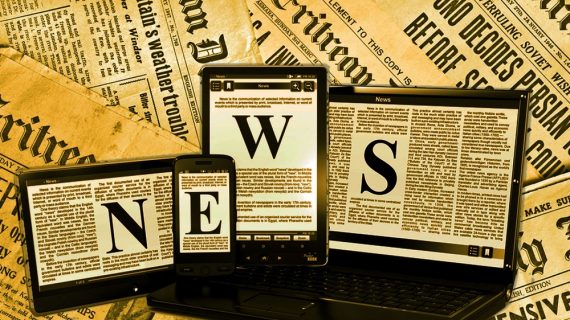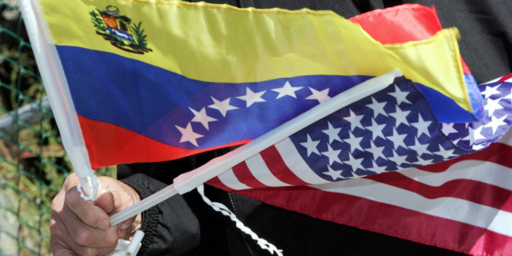Why is the NYT Paywall Up the Other 362 Days?
Its explanation for why its paywall is coming down 3 days leads us to an obvious question.

New York Times international editor Michael Slackman explains “Why The Times Is Taking Down Its Paywall for 3 Days.”
We are living at a moment in history when democratic values are under threat by authoritarian leaders. The internet, which holds such promise as a democratizing force, has been co-opted by people peddling divisive, hateful ideologies. Citizens around the world who want to speak out are under siege from their own governments.
Imagine if no one were watching.
Imagine if The Times were not able to report from Venezuela. The government there has tried to keep us out and has attacked our correspondents for their reporting because there is something it doesn’t want you to know: Infants in Venezuela are dying of malnutrition.
Imagine if we were not in Yemen, where a Saudi-led military coalition has prompted the world’s worst humanitarian disaster.
Imagine if we were not at the fence between Israel and Gaza as troops faced thousands of protesters hoping to crash through.Imagine if we were not in Mexico to reveal how the previous government used advanced spyware to attack and undermine civil society.
Every day, journalists at The Times and other mission-driven, independent news organizations around the world work hard to hold the powerful to account. To celebrate their work and press freedom, The Times is taking down its paywall from May 3 to 5 so everyone who registers can browse as many articles as they like.
As you read today’s news, or some of the remarkable stories I mention here, consider: What if no one were watching?
What, indeed.
For decades, The Times made a point of chronicling events big and small. Ships arriving in New York Harbor. Less-than-earthshaking resolutions at the United Nations. We were known, after all, as “the Newspaper of Record.”
We do less of that now.
History has taken to recording itself. Ship movements, United Nations resolutions and presidential speeches are all available to the curious with just a few keystrokes. So are the deep and passing thoughts of virtually every celebrity, to say nothing of those who aren’t celebrities at all — or weren’t until they blew up on social media.
And all that with no need to buy a newspaper.
Yet in a world awash in information, bearing personal witness has become even more important. That is why World Press Freedom Day resonates this year, perhaps more than in the past.
And that is why we are taking down The Times’s paywall for three days. We believe in what we do, and we think you will, too.
And I do.
I subscribe to the Times’ digital edition, along with a handful of other publications, notably the Washington Post. They’re great papers and they’re worth supporting.
But, of course, because they’re paywalled, they may as well not be watching for the vast majority of potential readers. I can’t and don’t subscribe to the most newspapers, including other great ones. Even though I’m better off than most, I can’t justify paying for the Financial Times, Wall Street Journal, the Los Angeles Times, the Times of London, and various other papers I’d otherwise read more regularly. For all practical purposes, they barely exist for me anymore.
Obviously, great reporting is expensive. Slackman and his colleagues deserve to make a decent living. They’re good at what they do and work hard at it. And, as documented here and elsewhere for a long time, the old business model of advertising has failed for just about everyone in the business.
The thing is, though, the reporting that’s behind a paywall has already been done. The ownership has simply decided to wall it off from the vast majority of the world.
In some ways, we’re back to the days before the Internet. Then, nobody expected to read the Times or any other paper for free. But we had a golden era that lasted for a dozen years or so when anyone who wanted to could read pretty much any news content they wanted so long as they had access to a computer and a broadband connection.
I don’t have a solution for any of this. I’m just not understanding how making the news “free” again for three days changes anything.





As long as the news is a profit-making business, they have to bring in revenue somehow and even the big traffic sites are apparently finding that online ads don’t generate the same revenue as print ads used to back in the day.
Some have suggested that the alternative is for news organizations to become non-profit corporations but then the question becomes, who is going to pay the bills?
This is a business dilemma that I don’t think anyone has figured out the answer to yet except perhaps the Wall Street Journal, which apparently makes money off its subscription services mostly because it services an industry where employers often pay for their employees subscriptions.
Well, most big city trashcans were replete with lots of copies of that day’s paper, right there for the taking.
I’ve yet to pay a penny for online news content(*). I still read maybe 80% of what grabs my interest in a given day (**). In fact, despite occasional but vigorous pruning, my Pocket list just keeps growing.
(*) Scribd, to which I’m subscribed, offers some magazines, but I’ve yet to check them out. I pay the subscription for the ebooks and audiobooks.
(**) Of the remaining 20%, about half is lack of time and the other half an insurmountable paywall.
I think it’s a mistake not to subscribe to the Wall Street Journal. Along with WaPo and the NYT, it is an essential news source. And its reporting is generally more fair and less overtly biased than NYT or WaPo–i.e., its reporting is “reporting” in the old-fashioned, traditional sense of the term.
They should explore taking their content off the world wide web and bringing it exclusively to the app world.
Because the people who work there can’t pay their mortgages with high fives?
I use an ad blocker and only white-list a very small handful of sites.
And I and abandon sites that require white-listing (Mediaite and Raw Story come to my mind – I just never go there anymore. They don’t want my eyeballs unless I turn my ad blocker off, so I don’t.)
Is that the right, moral, correct choice? Should I be white-listing more sites I regularly visit? What is the etiquette? Am I being a dick?
I finally subscribed to WaPo and the Times. A lot of the others I visit regularly, I subsist on “10 free articles”, or go to that city’s TV station websites. AZ Republic is good, KSL.com is good for Utah (and if you’re in the Rocky Mountain West area, they’ve got a top notch classifieds section, hookers to farming equipment 😉 ), and they link to a lot of the Tribune stuff I have to pay for if I go to the paper’s website.
I will certainly look at the sorts section, the only reason they are still in business. After the “wall” goes back up (no pun intended), I head back to Popular Science, Hot Rod, and “Hess and the Penguins: The Strange Case of Rudolf Hess” (Hess – one of the biggest mysteries of modern history, an enigma)
I doubt that very seriously for a publication that’s owned by Rupert Murdoch…
@An Interested Party: Same with the Sinclair-owned stations. There’s been a decided “tilt” since their big takeover. The only time I watch videos of the TV newscasts is on controversial stories that hit the Sinclair stations, just so I can watch the facial expressions of the hosts as they’re forced to read their propaganda.
@de stijl: I have two apps (?) that I use to surf the internet. The last time that I renewed Avast, it offered a internet surfing thingie that was much faster and didn’t f up as much as Firefox had started to do. So on the rare occasions that I want to read something that needs to have me whitelist someone on my main thingie, I use Firefox, which doesn’t have a built in ad-blocker.
I use Firefox fewer than 10 times a year. Most sources for news are fairly easily replaced and don’t need whitelisting.
@Jim Tantillo:
The WSJ is pretty expensive for someone whose employer isn’t footing the bill for them
@An Interested Party: WSJ is odd- really good reporting, with a nutjob editorial page. To the extent that there have been a couple of instances of Wall Street Journal reporters actually saying ‘I’m proud to work for this paper, we do a really good job, just ignore the editorial page.’
The reporting is often NYT/WaPo level, but the Ed page is garbage like you’d find at Breitbart or something.
@Doug Mataconis:
One thing about the internet is that the statistical data that is captured is significantly more comprehensive than what is available for print ads. Perhaps the cost of print ads, far exceed the actual value in the number of customers they drove to the advertiser.
@Sleeping Dog: Legal Notices is where they really make their money. By law, it’s required for most local governments to publish meeting minutes and make announcements in the paper, and a lot of simple court proceedings are the same. I went to go get my last name changed back to my maiden name when my husband died, and was shocked at how much it was going to cost just to get it published for 3 weeks in a row. You know, in case anybody had a problem with me getting the name I grew up with back. :-(
@Jim Tantillo:
It’s an excellent newspaper, albeit not of the caliber of the other two. Moreover, because it caters to business clients, subscriptions are radically more expensive.
@Stormy Dragon:
I acknowledge this in the OP. But, again, the stated rationale for making NYT available either applies every day or it doesn’t. If the pitch were simply, “We wanted you to see how great it is and hope that you’ll see how much you’d miss not having it” I wouldn’t have bothered to post.
@de stijl:
Yes and yes. But it’s completely understandable given that ads have gotten incredibly annoying—precisely to get around ad blockers and ad blindness—and it’s easy to argue that the convenience of ad blocking outweighs the minimal contribution your eyeballs would make to the bottom line.
@Teve:
The problem of the Editorial Page is not that they are nutjobs, is that they are embarrassing. They are a good reason for not subscribing to them, Murdoch should fire everybody there. It’s really that bad.
How ’bout looking at it as an advertising ploy? Sort of like when the lady at the grocery store gives you a tiny sip or taste of some product that you don’t normally use in the hope that you will try it for a while?
Or are you one of those “let’s go to Costco for free lunch” guys?
@Andre Kenji de Sousa:
“They are a good reason for not subscribing to them, Murdoch should fire everybody there.”
If only the Czar knew what his commissars are doing.
NYT, WSJ: Make your site free one day a week, every week – prove to us we should pay for the other days.